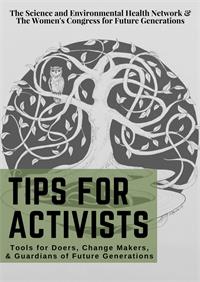Dear Friend of SEHN,
"Follow the money” is an old but useful adage. But if you can get out ahead of the money and direct its flow, even better. One of the big sections of the economy is government spending. In the United States, government (federal, state and local) spending is about 36% of the total economy. If you add the federal deficit, the total is 41% .
The way a government gets its revenue and spends its money is how it does the basic work of the people. Paraphrasing Barney Frank, government is what we choose to do together. Intervening in a state or local budget can be a powerful way to effect change simply because it affects what and how we choose to do it together. Activists are skilled at making a case for specific policy choices such as advocating for funding pollution control agencies or mental health programs but have less frequently argued for an overall approach to a government budget.
We invite you to consider looking at a state or local budget as a whole, starting with an express definition of what government is for. The budget will follow that definition. If government’s primary defined role is to grow the economy, then the budget will give money to corporations, starve public institutions and privatize public goods as well as neglect areas such as clean air or expanding state parks. Alternatively, if government’s role is defined as a public trust responsibility for the well-being of people, then the budget will require corporations to pay their fair share and will protect public health by cleaning up air and water, among many things. You can come up with your own list.
Last month we shared with you an examination of the Iowa state budget under those two views of government. The most common view held by many politicians is that government’s primary responsibility is to grow the economy and protect the free market. The existing Iowa budget reflected the current governor’s premise that her responsibility was the economy. A coalition of groups, co-convened by SEHN and the Iowa Sierra Club, took a detailed look at the Iowa budget because of two facts that didn’t make sense:
1) we were giving money away to the wealthiest of wealthy corporations and 2) our rivers are so polluted it is a national scandal.
Why was Iowa giving money to very wealthy corporations as tax incentives and tax credits when we couldn’t find the money to clean up some of the dirtiest water in the country?
Our coalition looked at the Iowa budget with the premise that government has a public trust duty to care for the things we share and to promote the well-being of its members. This stands in sharp contrast to the view that government’s job is to grow the economy. You can see our report here. It might be helpful to read that report before you read the guide to analyzing a government budget.
While much of any state budget is fixed expenses dedicated to education and health care, there are still millions of dollars that often go to corporations in the form of tax credits or tax incentives, as it is in Iowa. Environmental agency budgets are starved for funding while, say, Apple gets millions of dollars for a handful of jobs. As described above, this was, in fact, what prompted our work in Iowa. This Midwestern state, in the very center of the country, is the most biologically altered state in the Union. Iowa has less than 3% of its land base in any semblance of an intact ecosystem. Its water is notoriously filthy from hog farms and agricultural fertilizer. Yet the state budget neglects clean water in favor of goals such as “data analytics” .
After we had completed the first year of our budget analysis, New Zealand proposed a national budget based on well-being. With its new budget priorities, New Zealand is targeting things like domestic violence yet their theory of governing and budgeting matches the view that government holds a public trust duty to the well-being of people. Different states and cities will identify different problems that are threatening the well-being of their communities.
We are beginning the second year of work on the Iowa state budget but wanted to offer you a template for examining your own state or local budget and intervening in the process.
While this process is also applicable to the federal budget, there are some significant differences between state and local budgets and that of the federal government. For one thing, the United States can print money. Nevertheless, the basic approach of defining what government is for and guaranteeing that the budget follows that clearly defined role, applies to the federal government as well.
Click here for your copy of Volume 3 in the Activist Tips series.
 |
|

|
|
In keeping with this necessity of community-based work to better the future, we have a conversation with Caitlin Farley to share with you.
Caitlin Farley is an anthropologist focused on community and global health, the role of culture in health and the issues of trust between patients and healthworkers. Her graduate studies were based in Indonesia working with traditional healers, ethnopharmacologists and community members and she has also completed field work in Ireland, Singapore and with the immigrant and refugee community in the New England region of the US. She is currently working as an HIV project manager and Community Health Worker at a Community Health Center in Massachusetts, and spends her weekends singing, sailing and working on traditional wooden boats and exploring all the forests and waterways of her home.
In this episode, Caitlin discusses her work as a Community Health Worker, her research on community health abroad and traditional medicine, how she hopes to change the field in her future work, and how she became interested in the concepts of traditional medicine, medical anthropology, and cultural sustainability.
In this episode we touch upon issues of decolonization, bio piracy, and the effect of climate change on medicine, people, and future generations.
Click here for interview highlights & the full conversation.
|






